Related Research Articles
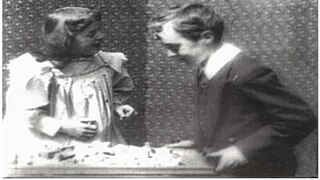
The House That Jack Built is a 1900 British short, silent trick film directed by George Albert Smith, featuring a boy who knocks over a house made of bricks built by his sister and then rebuilds it when the original sequence is shown in reverse. "In addition to exploiting a popular cinematic trick," of, "reversing the film in the projector," and, "its audience's presumed knowledge of the technique," the director, according to Michael Brooke of BFI Screenonline, "was continuing his experiments with narrative forms," with the reversed sequence, "interpreted as wish-fulfilment on the part of the girl, hoping that time will literally turn back on itself to allow her house to be rebuilt," he, "demonstrates that while this is impossible in reality, it is easily achievable in cinema."

The Old Maid's Valentine is a 1900 British short silent comedy film, directed by George Albert Smith, which features the titular Miss Pimple receiving an unpleasant surprise on 14 February. The film, according to Michael Brooke of BFI Screenonline, "is essentially a facial - a medium close-up shot of a single performer whose changing expression constitutes virtually all the film's dramatic action." David Fisher points out that, "the flapping of the sheet of paper and the movement of the calendar betray the open-air set," which, "makes it difficult to read the message: Just like Mama," whilst, "the remarkably well-behaved cat," which, "sits patently licking its paws," "suggests that Smith may have already learned the trick of smearing the cat's fur with food."

The X-Rays is an 1897 British silent comic trick film directed by George Albert Smith, featuring a courting couple exposed to X-rays. The 44-second trick film, according to Michael Brooke of BFI Screenonline, "contains one of the first British examples of special effects created by means of jump cuts" Smith employs the jump-cut twice; first to transform his courting couple via "X rays," dramatized by means of the actors donning black bodysuits decorated with skeletons and with the woman holding only the metal support work of her umbrella, and then to return them and the umbrella to normal. The couple in question were played by Smith's wife Laura Bayley and Tom Green, a Brighton comedian.
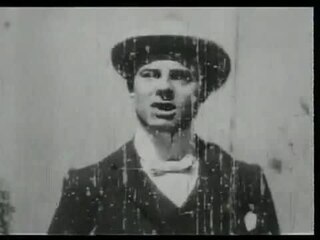
The Big Swallow is a 1901 British silent comic trick film, directed by James Williamson, featuring a man, irritated by the presence of a photographer, who solves his dilemma by swallowing him and his camera whole. The three-shot trick film is, according to Michael Brooke of BFI Screenonline, "one of the most important early British films in that it was one of the first to deliberately exploit the contrast between the eye of the camera and of the audience watching the final film".

Flying the Foam and Some Fancy Diving is a 1906 British silent comic trick film, directed by James Williamson, featuring a man diving from Brighton Pier while mounted on a bicycle, in both forward and reverse motion.

Walter Robert Booth was a British magician and early pioneer of British film. Collaborating with Robert W. Paul and then Charles Urban mostly on "trick" films, he pioneered techniques that led to what has been described as the first British animated film, The Hand of the Artist (1906). Booth is also notable for making the earliest film adaptation of A Christmas Carol with the silent film Scrooge, or, Marley's Ghost (1901).

Upside Down; or, the Human Flies is an 1899 British silent trick film, directed by Walter R. Booth, featuring a conjuror sending his audience to the ceiling. The film, "exploits a very simple illusion: that of filming with the camera turned upside-down so that the actors appear to be performing on the ceiling," and according to Michael Brooke of BFI Screenonline, "the effectiveness of the final result is such that nearly seventy years later Stanley Kubrick used the same technique in 2001: A Space Odyssey (1968)." The conjuror was reputedly played by Booth himself.

Undressing Extraordinary is a 1901 British silent comic trick film directed by Walter R. Booth, featuring a tired traveller struggling to undress for bed. The film, "provides one of the earliest filmed examples of something that would become a staple of both visual comedy and Surrealist art: that of inanimate objects refusing to obey natural physical laws, usually to the detriment of the person encountering them," and according to Michael Brooke of BFI Screenonline, "has also been cited as a pioneering horror film," as, "the inability to complete an apparently simple task for reasons beyond one's control is one of the basic ingredients of a nightmare."

The Waif and the Wizard, also entitled The Home Made Happy, is a 1901 British silent comic trick film, directed by Walter R. Booth, featuring a magician using his magic to aid an ailing girl at the request of her brother. The film, "is rather less elaborate in terms of special effects than the other films that W.R. Booth and R.W. Paul made the same year," but according to Michael Brooke of BFI Screenonline, "provides an excellent illustration of how effects used sparingly can often have more impact, especially when set in a suitable emotional context."
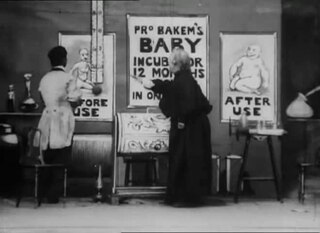
An Over-Incubated Baby is a 1901 British silent comic trick film, directed by Walter R. Booth, featuring a woman who gets an unpleasant surprise after placing her baby in Professor Bakem's baby incubator for 12 months growth in one hour. The film is, "one of the most original of the trick films made by W.R. Booth and R.W. Paul in 1901." According to Michael Brooke of BFI Screenonline, "one of the less elaborate films made by Booth and Paul that year, though the concept itself is so imaginative that it arguably didn't need any more than basic jump-cut transformations."

Cheese Mites, or Lilliputians in a London Restaurant is a 1901 British short silent trick film, directed by Walter R. Booth. A gentleman is entertained by the little people who emerge from the cheese at his table.

Artistic Creation is a 1901 British silent comic trick film directed by Walter R. Booth, featuring a lightning sketch artist drawing a picture of a woman which comes to life piece by piece. The film "is one of the earliest examples of a film about an artist's creations coming to life," and according to Michael Brooke of BFI Screenonline, "a metaphorical cautionary tale about the responsibilities that should be borne by both creative artists and indeed the male sex in general."

The Extraordinary Waiter is a 1902 British silent comic trick film, directed by Walter R. Booth, featuring a brutish colonialist failing to destroy a blackfaced waiter. The film "makes for somewhat uncomfortable viewing," but according to Michael Brooke of BFI Screenonline, "it's just about possible to read this as a metaphor for the rather more widespread frustrations arising from British colonial rule, though it seems unlikely that this was intentional on Booth's part."
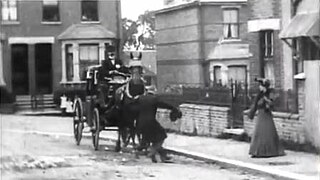
An Extraordinary Cab Accident is a 1903 British silent comic trick film, directed by Walter R. Booth, featuring a gentleman making a miraculous recovery after being trampled underfoot by a horse and cab. The film, "seems something of a step back," "compared with the elaborate special effects fantasies that director W.R. Booth and producer R.W. Paul had already concocted," but according to Michael Brooke of BFI Screenonline, "more complex special effects might well have worked against the impression Booth and Paul were clearly seeking to create, which is that of a man being genuinely run over by a horse-drawn cab, his body being knocked down and trampled by the horse's hooves."
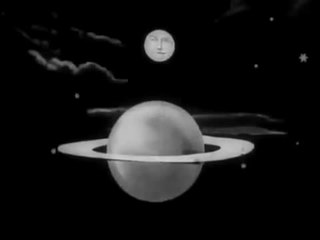
The '?' Motorist is a 1906 British silent comedy trick film, commonly called "The Mad Motorist" or "Questionmark Motorist" and directed by Walter R. Booth. Released in October 1906, the film is "one of the last films that W.R. Booth made for the producer-inventor R.W. Paul," and, according to Michael Brooke of BFI Screenonline, "looks forward to the more elaborate fantasies that Booth would make for Charles Urban between 1907 and 1911, as well as drawing on a wide range of the visual tricks that Booth had developed over the preceding half-decade."

Is Spiritualism a Fraud? is a 1906 British silent trick film directed by Walter R. Booth, featuring a medium exposed as a fake during a séance.

The Magician is a 1898 French silent trick film directed by Georges Méliès, featuring a wizard, a Pierrot and a sculptor in a rapid series of substitution splices. The film is, "another exercise in the art of the jump-cut," according to Michael Brooke of BFI Screenonline, "in the tradition of Georges Méliès' earlier A Nightmare and The Haunted Castle ."

The Automatic Motorist is a 1911 British silent comic trick film, directed by Walter R. Booth, featuring a robot chauffeur taking an inventor and a young honeymooning couple on a wild ride around the planets and under the sea. The trick film is a "virtual remake of The '?' Motorist (1906)," according to Michael Brooke of BFI Screenonline, "but on a bigger scale."

Willie's Magic Wand is a 1907 British silent comic trick film, directed by Walter R. Booth, featuring a young boy terrorising the household with his father's magic wand.
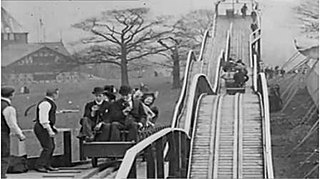
A Switchback Railway is an 1898 British short black-and-white silent actuality film, directed by Robert W. Paul, featuring patrons riding on a switchback railway at a fairground at Alexandra Palace, where Blandford Hall can be seen in the background. "This dynamically composed actuality," according to Michael Brooke of BFI Screenonline, "was clearly a success, so much so that James Williamson and the Riley Brothers released their own switchback railway films only a few months later." It is included on the BFI DVD R.W. Paul: The Collected Films 1895-1908. It is arguable that the filmmaker, R.W. Paul, missed a trick by not placing the camera inside one of the moving cars to simulate the ride from the passenger's perspective, although he might have had difficulty keeping the camera steady. Nonetheless, the film was clearly a success, so much so that James Williamson and the Riley Brothers released their own switchback railway films only a few months later.
References
- ↑ Brooke, Michael. "The Haunted Curiosity Shop". BFI Screenonline Database. Retrieved 24 April 2011.